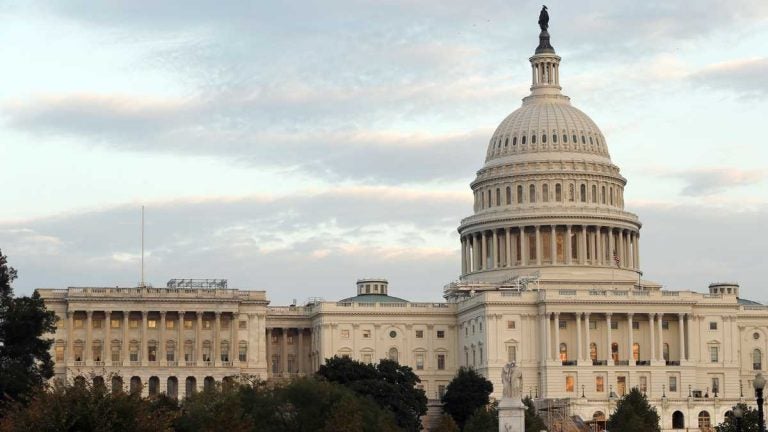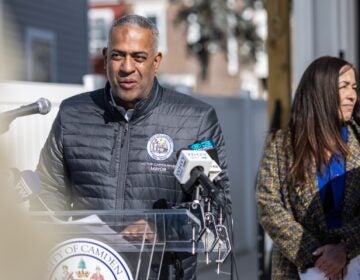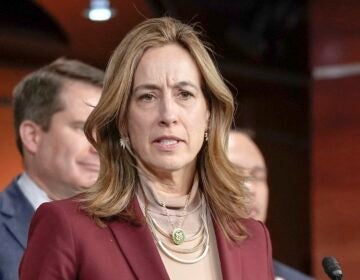The N.J. primaries in perspective: The most important results — and what they mean
The notable upset came in the 2nd District Republican contest, where Grossman pulled away from Singh, but the Menendez-Hugin matchup is already getting even uglier

The U.S. Capitol in Washington. (Alex Brandon/AP Photo, file)
Democrats took to the polls yesterday, ushering in a new slate of candidates that are expected to mount serious challenges to Republican congressional incumbents in November. And there were no upsets among the Democrats, as those that had earned the party line — the pick of Democratic chairmen and county committees — proved to be winners in every contest. Follow this link for a full list of primary results across the state.
There was one upset on the Republican side, and Seth Grossman, a serious conservative and radio announcer on WVLT Vineland, 92.1 FM, beat out Hirsh Singh, the GOP organizational candidate, for the Republican ticket in the 2nd District. Grossman will face Jeff Van Drew, a popular Democratic state Senator, in November.
But all was not good news for the Democrats: U.S. Senator Bob Menendez faced a serious challenge from Lisa McCormick, a publisher of a weekly newspaper and community website from Rahway, with a number of observers noting it did not bode well for the three-term Democrat in the fall. With almost all votes in, Menendez won about 62 percent to McCormick’s 38 percent.
“When you have an incumbent U.S. Senator barely getting 60 percent of vote versus what is essentially a name on the ballot — an unknown — that is a big sign of weakness,” said Patrick Murray, director of the Monmouth University Polling Institute. Although Murray wasn’t willing to say Menendez might lose — “the overriding dynamic in New Jersey is their feelings about (President Donald) Trump” — Murray expects Menendez’s unpopularity to be somewhat of a drag on downballot races, such as the tight 7th and 11th districts, where Democrats are trying to turn red seats to blue. Menendez was recently on trial for federal corruption charges, which ended in a hung jury. Federal prosecutors later dropped all charges.
John Currie, state Democratic chairman, agreed that there was clearly a protest vote at work against the senator that would need to be addressed.
“His numbers are not where I’d want them to be,” said Currie. “But I still think his numbers are good. When we start getting to our message and can respond (to attacks), we’ll be better.”
Scoffing at the idea that Menendez is in trouble, Brigid Harrison, professor of political science and law at Montclair State University, agreed with Currie. “At the end of the day, Menendez has a 2-to-1 partisan advantage, and many of those people recognize that Menendez is the single-most important block to Trump. We haven’t had a campaign yet, and by then, it will be a different race.”
What is easy to predict is that the race will be nasty. Robert Hugin, who will face Menendez in November, is the chair and former CEO of pharmaceutical Celgene. Hugin has been relentless in his attacks on Menendez, ignoring his primary opponent but pointing to Menendez’s federal trial. Then again, Menendez, in his victory statement, called Hugin “greedy,” guilty of driving up drug prices, and ripping off cancer patients.
Turnout turns up slightly
Although all votes haven’t been counted, turnout appeared slightly higher than normal. About 20 percent of Democrats and 19 percent of Republicans voted. The highest percentage turnout for Democrats was in Hunterdon County, with 34 percent; the highest for Republicans was 26 percent in Sussex.
But Murray noted that Democrats outvoted Republicans in the three most watched races — the 2nd, 7th, and 11th.
“I think that’s a big sign of enthusiasm by Democrats,” he said.
House races yield at least one surprise
Probably the only surprise in New Jersey’s closely watched congressional races was in the 2nd district Republican primary, in which Seth Grossman beat party choice Hirsh Singh, an engineer from Linwood, by nine points. Grossman, a Somers Point attorney, is a weekly conservative talk show host in the region.
Harrison was surprised at the result, noting that although Grossman has name recognition, “it takes a lot for party faithful to cross over the line and vote for someone else.” Grossman leans to the Tea Party, she said, and could match some views of the Republican voters in the district.
Nevertheless, Harrison saw the result as a repudiation of the party leaders in the region. “It’s a total rejection of the powers to be there,” she said, with local Republicans expressing their dissatisfaction at the polls. “Certainly, the county leaders can’t control the nominating process. That says a lot.”
Grossman will face popular state Sen. Jeff Van Drew (D-Cape May), who easily beat three challengers with 55 percent of the vote. Van Drew is considered a conservative Democrat and a good match for the district. Van Drew and Grossman will be vying for the seat of Rep. Frank LoBiondo, a twelve-term incumbent who announced his retirement early last year.
11th District
As expected, Mikie Sherill, a former Navy pilot and federal prosecutor, sailed to victory over four other challengers with 77 percent of the vote. Sherill will be vying for the seat vacated by long-term Republican incumbent Rodney Frelinghuysen, the chair of the House Appropriations committee who was under constant attack by Democrats in the district this past year.
Jay Webber, a Republican state assemblyman from Morris Plains, had a harder time vanquishing his opponent Peter De Neufville, a Mendham businessman. Winning the nomination with 40 percent of the vote to the 31 percent of his opponent, De Neufville, Webber, and Sherill will face off in November.
“The next step is the most important election of our lives,” Sherrill said before an energized crowd of supporters Tuesday night. “Make no mistake, we are going to need to be tough, we are going to need to be focused, we’re going to need to be committed.”
She didn’t mention President Trump’s name once in her 14-minute speech at a Verona catering hall, but left little doubt about her target when she invoked the importance of service and democracy and of issues like healthcare and infrastructure. “We have not just built a campaign for Congress, but a movement for change,” she said.
The 11th district was an early site of active grassroots campaigning. Dana Pogorzelski of Mountain Lakes, a founder of the group “11th for Change,” started meeting with friends and colleagues in the immediate aftermath of Trump’s election.
“The amazing thing about the group is we had a lot of people who would have never gone out and talked to people and canvased and put themselves out there,” she said. “They were on the periphery, only partially interested. And now they are warriors to the cause. That’s what is really exciting.”
7th District
The 7th District may turn out to be the most hotly contested of any in November, as it will pit incumbent Republican Leonard Lance against Tom Malinowski, a former diplomat and member of the Obama administration. Lance won easily against two challengers with 75 percent of the vote. Malinowski, who initially faced six other candidates to win the party nod, ended up garnering 67 percent of the primary vote.
But the 7th district, like the 11th, is a suburban district that has tilted slightly to the right in past years and is considered up for grabs. It has a crowd of highly energized Democrats and voted slightly in favor of Hilary Clinton in 2016.
Like other Democrats, Malinowski told supporters Tuesday that November will be the most important non-presidential race in his lifetime.
“We’ve got to win 23 across this country and that task runs through the 7th district,” said Malinowski, making clear what this year’s challenge should be. “We are a swing district. We can do something small in our district with the knowledge that our fellow Americans across the country are doing the same thing.”
With his speech, Malinowski made it seem as if the race will be more genteel than some and entirely about changing Congress from red to blue. “Leonard Lance is not a bad person,” said Malinowski, “but he had his chance to step up and be the leader that these times demand and he has not done that.”
Other races
In other prominent races, Joshua Welle, a Rumson resident and Navy veteran, won the Democratic nomination against Jim Keady, a liberal activist from Spring Lake, in the 4th District. Welle won 57 percent to 43 percent. He will face 38-year incumbent Chris Smith in November.
John McCann Jr., an attorney from Cresskill, beat perennial candidate and former Bogota mayor Steven Lonegan, for the Republican nomination in the 5th district. McCann garnered 53 percent of the vote to Lonegan’s 47 percent.
McCann will face first-term Josh Gottheimer, a Democrat, in what was once a solidly red district. Gottheimer, a moderate Democrat, won the seat in 2016 after a relentless campaign. National Republicans now hope to swing the district back to red this year.
Follow this link for a full list of primary results across the state.
—
— John Reitmeyer and John Mooney contributed to this story.
WHYY is your source for fact-based, in-depth journalism and information. As a nonprofit organization, we rely on financial support from readers like you. Please give today.




